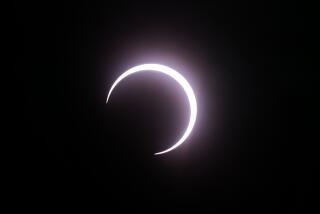The Washington Summit : Utah Town’s Residents Are Ready for the Russians : Treaty’s Missile Verification Pact Will Bring Soviet Team to Magna
- Share via
MAGNA, Utah — The Russians are coming to this mining town where the American flag flies over the VFW post on Main Street and patriotism is as rock-solid as the frozen winter earth. And well, sure, we’re excited, the residents say, but can you trust the Russians?
This will be no flyby. The Soviets, 30 to 40 of them, will spend 13 years here, verifying U.S. compliance with the intermediate-range nuclear missile treaty signed Tuesday in Washington. On the outskirts of town is the Hercules Aerospace Co., which has made solid rocket engines for the Pershing 2 missile, one of the weapons to be eliminated under the treaty.
At the American Lumber and Hardware Store, Terry and Susan Kinder have posted a large sign: “Arm Yourself With a Bazooka.” Customers who ask whether the Kinders really plan to hold off the Soviet invasion with heavy weapons are given a laugh and a piece of Bazooka Bubble Gum.
“We should applaud this treaty,” Kinder said. “All mankind wants to see the missiles come to an end, but these Russians are so sneaky, saying one thing and doing another. How many treaties have they honored? As far as I’m concerned, they’re going to be like a new stranger on the block, and I’m going to keep my eyes open to make sure they only do what they’re supposed to do.”
Down the street, the operator of a do-it-yourself carwash has tried to drum up some nationalistic business with another sign: “Wait Until Soviets See Our Clean Cars.” But there was snow in the Wasatch Mountains and a cold, wet wind blew through Magna, so the carwash’s three stalls remained empty most of the day.
Unionized, Democratic Town
The Soviets, who are to arrive soon after the treaty is ratified, will find a blue-collar, unionized town, populated largely by Mormons, in the shadow of the Kennecott copper mine. Magna is so Democratic that when the dentist, Carl Clark, a resident of 38 years, ran for the state legislature as a Republican, “I got clobbered 3 to 1. Even my family voted against me.”
Clark was humming “Walking in a Winter Wonderland” the other morning as he entered Tom Dyches’ drugstore, where much of the town gathers to take advantage of the $1.49 early bird breakfast and to keep up friendships that have lasted a lifetime. These days the talk at Dyches’ soda fountain is mostly about the Soviets.
“I’m not too concerned about the Russians,” Dyches said. “Are you, Carl? If they serve the purpose they’re meant to serve, and don’t become subversive, we can put up with it. Heck, maybe they’ll even be good customers.”
Logistics Still Unclear
“There’s talk they’re going to be in compounds,” Clark said. “Well, I’d kind of like to see them bring their families. If ordinary people get to know each other, then maybe our governments will stop hating each other’s guts. I’d like to convert the Russians--not to Mormonism but to understanding that Americans are nice people.”
Thus far, it is not clear to anyone in Magna, including Ted Olsen, a local spokesman for Hercules, where the Russians will live, whether they will bring their families or precisely how they will operate.
While Magna, 16 miles west of Salt Lake City, becomes the home of the Soviet inspectors, a similar number of Americans will take up residence in the Soviet Union. They will go to Votkinsk, a city west of the Ural Mountains where SS-20 missiles have been assembled.
Neither team will be allowed in the other’s missile plants, but each can monitor on a 24-hour-a-day basis what leaves the plants. The teams can also make surprise visits for inspection purposes to other weapons plants--20 a year in the first three years of the treaty, 15 a year in the next five years and 10 a year in the last five years.
‘Missile-Oriented’ Operation
The technicians also will be responsible for keeping an inventory of the other side’s weapons and for monitoring the destruction of warheads and launchers.
The Hercules plant here, which employs 4,000 people from all over the Salt Lake City area, is a major aerospace manufacturer. It produced not only the Pershing 2 engines but similar engines for the land-based MX intercontinental missile and for the submarine-launched Trident 2 ballistic missiles.
Olsen, the Hercules spokesman, said that 75% to 80% of the company’s Magna operation is “missile oriented.”
Some environmental groups have expressed concern that the U.S. Army’s plan to destroy the Pershing 2 missiles, by burning them in open pits at the Tooele Army depot near Magna, will harm Utah’s atmosphere. And Sen. Orrin G. Hatch (R-Utah) has said he wants to make sure the Votkinsk site is compatible in significance with the Magna facility before approving the plan.
Recalling ‘Displaced Russians’
Other than that, though, Magna seems ready to welcome the Soviets as neighbors, if not friends.
“You know, I was trying to think if I’d ever met any Russians,” said Dee Peel, Magna’s mortician, “and I remembered the displaced Russians we encountered during World War II as we were going through Germany. I remember them as round-faced, happy-go-lucky and not afraid of work. Then there was old Sam Max, a Russian Jew. He had a clothing store here for years and years. I still play golf with his son.”
At the Webster Elementary School, a 21-inch Zenith television had been placed outside the office of Principal Cyndy Cannell, and it was tuned Tuesday to ABC’s “Good Morning, America.” A network crew had been in Magna, as had reporters from as far away as Boston and New York, and the story of Magna’s reaction to the Soviets’ arrival was scheduled to be on about 8:30 a.m.
‘A Chance to Share’
“The children are really excited about the Russians,” Cannell said. “They say, ‘What do they eat?’ ‘How do they dress?’ ‘Are they like us?’ This really is a wonderful cultural opportunity. It gives us all a relating point, a chance to learn about another country and to share what we know as Americans.”
“But I think the kids are confused, too,” said the fourth-grade teacher, Joe Novak.
“That’s true,” Cannell said. “Some are a little scared. They’re concerned that the Russians’ motives aren’t purely on the up-and-up. Maybe they’ll want to plant some bombs, some of the children have said. Of course, some of this sounds like their parents’ thoughts are coming through.”
By 9 a.m., the Magna segment still hadn’t aired on “Good Morning, America” and the school secretary, Julie Sandoval, who attended Webster, as did her parents and grandparents, called KTVX, the ABC affiliate in Salt Lake City. She was told that the Magna story had been shunted aside by the first meeting between President Reagan and Soviet leader Mikhail S. Gorbachev.
“I asked them if Reagan and Gorbachev were really more important than Magna, and they said yes,” Sandoval said, turning off the TV.
More to Read
Sign up for Essential California
The most important California stories and recommendations in your inbox every morning.
You may occasionally receive promotional content from the Los Angeles Times.













